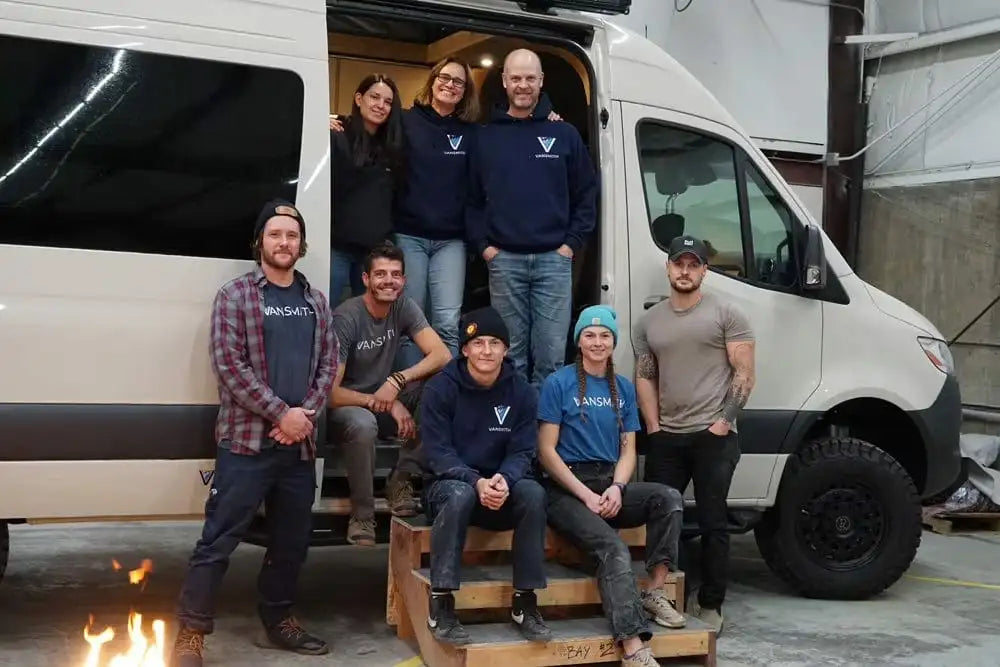If you’ve ever dreamed of complete freedom on the open road, off grid RV living makes it possible. With solar power, efficient storage, and smart planning, your camper or motorhome can become a self-sufficient home that takes you anywhere. This guide covers everything you need to know to enjoy RV off grid living safely, comfortably, and sustainably.
What Is an Off-Grid RV?
An off-grid RV is designed to operate independently from traditional hookups like water, electricity, and sewer. It’s ideal for travelers who value solitude, adventure, and sustainability. You’ll rely on solar panels, batteries, propane, and other self-sustaining systems to power and maintain your daily life.
At The Vansmith, our focus on innovative designs that bring comfort to your journey ensures that even when you’re far from civilization, your setup feels like home.
Benefits of an Off-Grid RV
Living off the grid gives you freedom to explore remote landscapes, from alpine passes to desert mesas. Benefits include:
-
Independence from crowded RV parks
-
Cost savings over time
-
Closer connection to nature
-
Sustainable living with renewable energy
With the right setup, living off grid in a camper offers both adventure and peace of mind.
Power: Building Your Energy System
Solar Panels
Solar power is the cornerstone of off grid motorhome living. Most full-time travelers use 400–800 watts of panels mounted on the roof. Flexible or rigid panels work depending on your roof type and travel style.
Battery Bank
Store energy using lithium or AGM deep-cycle batteries. A 400–600Ah lithium setup provides enough capacity for lights, appliances, and a fridge during extended stays.
Backup Generator
A small gas or propane generator adds redundancy. Use it when weather limits solar output or during heavy power use.
Energy Efficiency
Switch to LED lights, energy-efficient appliances, and use inverter chargers that optimize charging cycles. Reducing power demand is just as important as generating it.
Water: Storage and Source
Storage
Carry at least 30–50 gallons of fresh water for boondocking. Collapsible tanks or under-bed reservoirs can add capacity.
Source
Refill at campgrounds, city parks, or mountain streams using portable filters. Always purify your water before drinking — gravity filters or UV purifiers are reliable options.
Waste Management
Black and Gray Tanks
Traditional RVs use tanks to hold waste and gray water. Monitor levels regularly and empty responsibly at designated dump stations.
Composting Toilet
A composting toilet is a popular choice for motorhome living off grid. It separates solids and liquids, reduces odor, and eliminates the need for a black tank.
Propane Systems
Propane fuels stoves, fridges, and heaters. It’s efficient, portable, and easy to refill across the country.
At The Vansmith, we prioritize sustainability in every van, integrating efficient systems that reduce waste and environmental impact.
Heating and Cooling
Propane and Diesel Heaters
Compact heaters like Webasto or Espar units keep you warm in winter while using minimal fuel. Always ensure proper ventilation.
Insulation
Wool or foam insulation maintains steady temperatures. Combine with insulated window covers to retain heat at night and block sun during summer.
Other Considerations
Internet
Reliable internet keeps you connected while living off grid in a camper. Use mobile hotspots, Starlink, or signal boosters to stay online for work or navigation.
Vehicle Maintenance
Regular oil changes, tire checks, and inspections are key. Remote areas don’t offer quick roadside help, so carry spare tools and fluids.
Tires
Choose all-terrain or load-rated tires suited for dirt roads and mixed conditions.
Location: Finding the Best Places to Live Off the Grid in America
When choosing a home base or long-term stay, consider climate, access to water, and cost of living.
Iowa
Affordable land and relaxed zoning laws make Iowa one of the best places to live off the grid in America.
Hawaii
Abundant sunshine supports solar power year-round, though land costs are higher.
Alabama
Low taxes and mild winters create ideal conditions for off grid RV living.
Texas
Large rural areas, varied climates, and minimal restrictions attract full-time travelers.
Colorado
Mountain vistas and strong solar exposure make it perfect for adventure seekers, though winters require solid insulation and heating.
Oregon
Known for eco-friendly living and scenic coastlines, Oregon offers excellent resources for sustainable setups.
Alaska
The frontier for true independence, Alaska demands serious preparation and insulation for year-round off grid motorhome living.
Maine
Cool summers, forested land, and community-minded towns make Maine a great best place to live off grid in USA for minimalists and nature lovers.
Final Thoughts
Off grid RV living is about balance — independence without sacrificing comfort. With the right systems for power, water, and waste, you can live anywhere your wheels take you.
At The Vansmith, we design and install systems that let travelers explore freely while protecting the planet. From solar packages to heater installs, our repairs and installation service keeps your van running efficiently for every off-grid journey.
FAQs
What power systems do you need to live off grid in an RV?
Solar panels, a battery bank, and a generator provide balanced, dependable power.
How much solar power is required for off-grid RV living?
Most setups need 400–800 watts of panels and 400–600Ah of lithium batteries.
How do you store and purify water while living off grid?
Use onboard tanks with filters and refill from safe sources such as campgrounds or streams.
What is the best waste management option for off-grid RV life?
A composting toilet minimizes odor and eliminates black water dumping.
Do you need a generator if you already have solar panels?
Yes. Generators are useful backup systems for cloudy days or high-demand periods.
How do you heat an RV while living off grid?
Diesel or propane heaters work efficiently in cold climates.
What size battery bank is ideal for off-grid RV living?
Aim for 400–600Ah lithium to handle moderate energy needs comfortably.
Can you live off grid in an RV during winter?
Yes, with proper insulation, heating, and battery maintenance.
How do you stay connected to the internet while living off grid?
Combine cellular hotspots with satellite systems for reliable connectivity.




